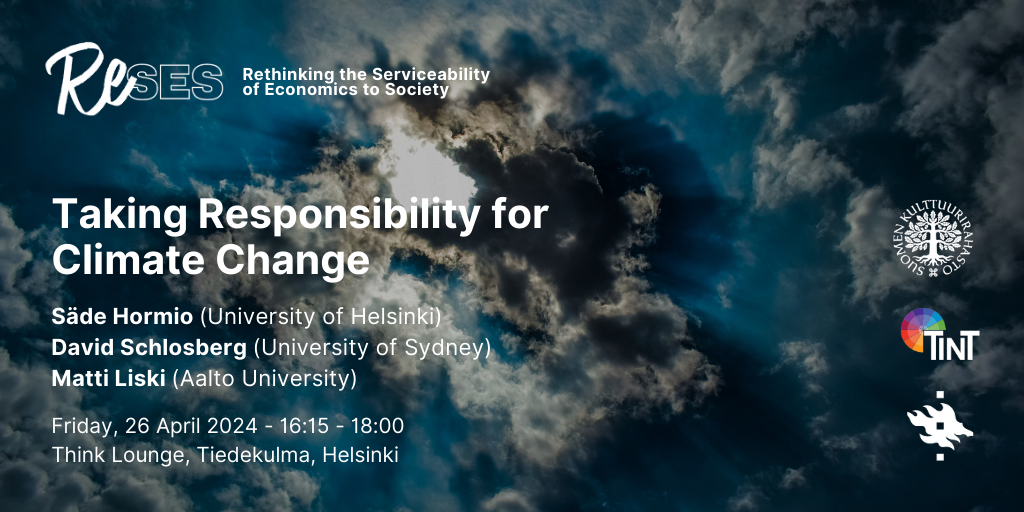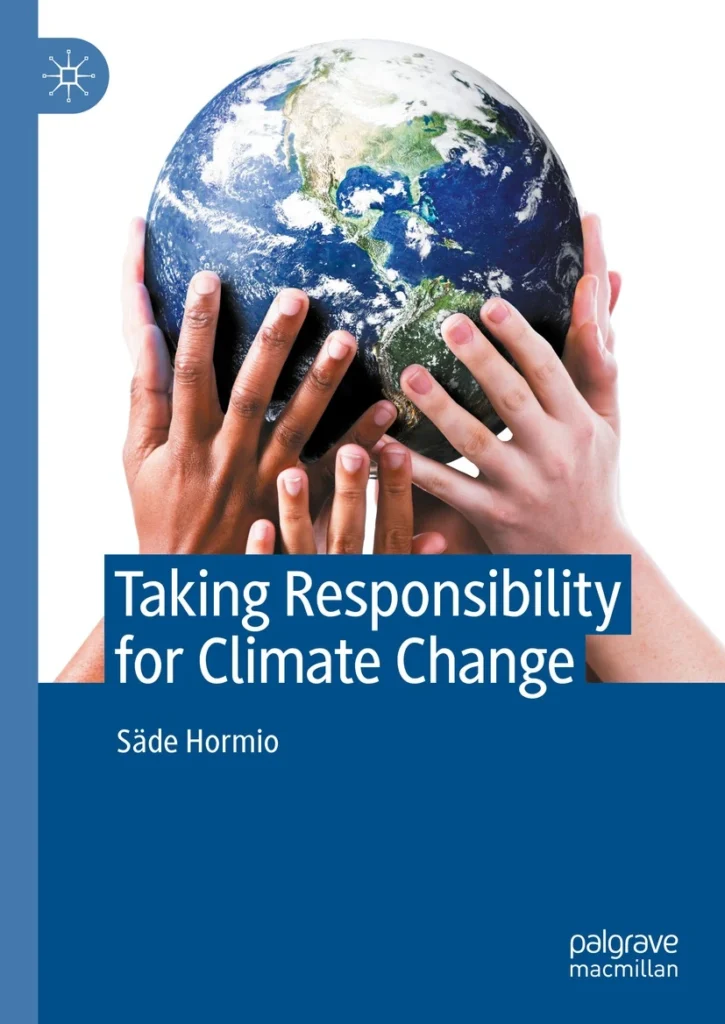
ReSES – Rethinking the Serviceability of Economics to Society warmly invites you to an exciting event that transcends traditional disciplinary boundaries, focusing on the critical intersection of ethics, economics, and politics in addressing the global challenge of climate change.
Speakers:
- Säde Hormio (University of Helsinki)
- David Schlosberg (University of Sydney)
- Matti Liski (Aalto University)
Date: Friday 26 April 2024
Time: 16:15 – 18:00
Location: Think Lounge, Tiedekulma, Yliopistonkatu 4, 00100 Helsinki
Online streaming: https://www.youtube.com/watch?v=4shQgwvwklo
This unique gathering is inspired by the pivotal work Taking Responsibility for Climate Change by Säde Hormio, offering an exploration of climate responsibility beyond conventional narratives.

Taking Responsibility for Climate Change (Palgrave Macmillan 2024) proposes that it is not only states and international bodies that have a responsibility to take action toward mitigating climate change. Other collective agents, such as corporations, need to also come onboard. Additionally, the book argues that climate change is not solely a problem for collective agents, but also for individuals, as they are members of collectives and groups of several kinds. Therefore, framing climate change responsibility exclusively from either the collective or the individual perspective leaves out something crucial: how we all are influenced by the collectives we belong to and how, in turn, collectives are influenced by individuals.
The focus of the book is on areas of climate change responsibility that are often left out of the picture or get too little attention in climate ethics, such as carbon inequality within countries. But why should any theoretical arguments about normative issues matter when we have a real-life climate crisis on our hands? Säde Hormio argues that ethical arguments have an important role in setting climate policy: they can highlight what values are at stake in economic analysis and help ground normative arguments in public deliberations.
The event will provide a critical perspective on the technocratic solutions based on climate economics while acknowledging the vital role of economics in addressing climate change, informed by the rich insights from Taking Responsibility for Climate Change.
Particularly, Hormio’s work critically examines how:
- Climate change demands action at every level of society, from governments, organizations and groups of every size, down to individuals.
- The traditional reliance on technocratic decision-making in climate policy is challenged, highlighting the need for a more inclusive approach that recognizes the complexity of value choices and the importance of public debate.
- The book addresses the critical issue of carbon inequality.
This event is an invitation to engage with the ethical, economic, and political dimensions of climate change in a manner that acknowledges the complexity and urgency of the issue. It offers a platform for:
- Deepening the understanding of the interplay between economic models, ethical considerations, and climate policy.
- Stimulating dialogue on how to integrate ethical frameworks into economic decision-making and public policy.
- Reflecting on the broader implications of economic choices in the context of global climate challenges and societal well-being.
We are looking forward to your participation in this thought-provoking event.
Information about the speakers
Säde Hormio is an Academy Research Fellow in Practical Philosophy at the University of Helsinki. She is also affiliated with the Institute for Futures Studies in Stockholm. While writing the book, Hormio was a Marie Skłodowska-Curie Global Fellow. She has published articles on collective responsibility and social epistemology, and co-edited The Ethical Underpinnings of Climate Economics (Routledge 2017). Taking Responsibility for Climate Change is her first monograph.
David Schlosberg is Director of the Sydney Environment Institute and Professor of Environmental Politics at the University of Sydney, and Erkko Visiting Professor of Studies in Contemporary Society at the Helsinki Collegium for Advanced Studies. His main theoretical interests are in environmental politics, environmental movements, and political theory, and in particular the intersection of the three with his groundbreaking and highly-cited work on environmental, ecological, and multispecies justice. His other theoretical interests are in climate justice, climate adaptation and resilience, and environmental movements and the practices of everyday life.
Matti Liski is a Professor of Economics at Aalto University School of Business. He is also an affiliate at MIT-CEEPR, University of Cambridge EPRG, CESifo Munich, and has been a visiting professor at Toulouse School of Economics. His research focus is both theoretical and empirical microeconomics with applications in industrial organisation, public policy, energy markets, and climate change.


